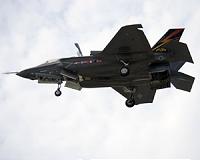 |
Tel Aviv, Israel (UPI) Oct 8, 2010 Israel's purchase of 20 Lockheed Martin F-35 stealth fighters, the world's most advanced combat jets, significantly enhances the Jewish state's ability to defend itself "by itself," in the words of U.N. Ambassador Michael Oren. His comment following Thursday's contract signing in New York, is a clear reference to possible conflict with Iran, against whose nuclear installations Israel has threatened to launch pre-emptive strikes. However, Israel is unlikely to take delivery of the first of the fifth- generation fighters until 2015 at the earliest, with completion scheduled for 2017. That should rule the F-35s out of any long-range mission against Iran for at least four years, by which time the Tehran regime may already have developed a nuclear weapon. The $2.75 billion contract was signed by the director-general of Israel's Defense Ministry, retired Maj. Gen. Ehud Shani, and the Deputy Undersecretary of the U.S. Air Force Heidi Honecker Grant after several years of tortuous negotiations. The F-35s will equip one squadron of the Israeli air force, with each aircraft costing around $96 million, together with training simulators, spare parts and associated equipment. Oren said that Israel expected to acquire "a couple of dozen" more F-35s at an unspecified time. Israel had initially wanted to buy 25 of the radar-evading fighters with an option for 50 more -- enough to equip four squadrons with most powerful aircraft in the Middle East. Most of the cost involved in the 20-unit sale will be covered by U.S. military aid to Israel, which currently runs at around $3 billion a year, plus Israel's defense industry will get around $1.4 billion in contracts for components for the jets. The timing of the contract suggested the U.S. administration of President Barack Obama may have fast-tracked the deal as an inducement to Israeli Prime Minister Binyamin Netanyahu to extend a freeze on settlement building in the West Bank, still largely under Israeli occupation, to salvage threatened peace talks with the Palestinians. Obama has staked a lot of political capital into reviving the peace process and achieving some sort of agreement between Israel and the Palestinians. That would be a major political coup for him, although it is unlikely in the current climate that significant progress can be achieved before the Nov. 2 U.S. midterm elections. There has been little sign that Netanyahu's right-wing-led coalition was prepared to risk a domestic backlash by extending the 10-month freeze launched in 2009 and which recently expired. The White House last week denied reports that Obama had offered Netanyahu significant military, political and economic incentives for a two-month building moratorium extension. However, Oren told The Washington Post that the administration had made "a number of suggestions, incentives if you would, to the Israelis that would enable the government to maybe pass a limited extension of two or three months." Israel has recently received pledges of hefty U.S. financial support to develop air-defense systems to counter hostile missiles -- currently a critical threat not only to military installations such as air bases but to major population and industrial centers such as Tel Aviv as well. It will be the first country to receive F-35s through the U.S. government's Foreign Military Sales process, thus becoming the first customer outside the nine-nation U.S.-led group developing the jet. The F-35 program has been plagued by problems that have delayed it by two years and driven up the cost of the aircraft. The Israeli purchase could help counteract those setbacks. Lockheed Martin, the lead contractor, claims the F-35's stealth capabilities and integrated weapons systems make it superior to all other aircraft in air-to-air combat while being able to conduct ground-attack missions. Northrop Grumman and BAE Systems of Britain are providing key components for the program. The F-35, which is destined to equip the U.S. Air Force, the Marine Corps and the U.S. Navy, is being developed in three configurations, the A version for conventional operations, the F-35B for short takeoff and vertical landing, and the C for navy carriers. Israel is acquiring the F-35A version but the Americans have agreed to allow Israel to install its own electronic warfare and communications systems and it will be designated as the F-35I.
Share This Article With Planet Earth
Related Links Aerospace News at SpaceMart.com
 Norway delays order of F-35s
Norway delays order of F-35sOslo, Norway (UPI) Oct 1, 2010 The Norwegian government says it will delay its purchase of 16 of 20 F-35A Joint Strike Fighters as part of its bid to slash spending. The Norwegian Defense Ministry said the order would be pushed back by two years to 2018, reaffirming, however, its commitment as a "serious and credible partner" to the Joint Strike Fighters program. Defense Minister Grete Faremo said the delay si ... read more |
|
| The content herein, unless otherwise known to be public domain, are Copyright 1995-2010 - SpaceDaily. AFP and UPI Wire Stories are copyright Agence France-Presse and United Press International. ESA Portal Reports are copyright European Space Agency. All NASA sourced material is public domain. Additional copyrights may apply in whole or part to other bona fide parties. Advertising does not imply endorsement,agreement or approval of any opinions, statements or information provided by SpaceDaily on any Web page published or hosted by SpaceDaily. Privacy Statement |